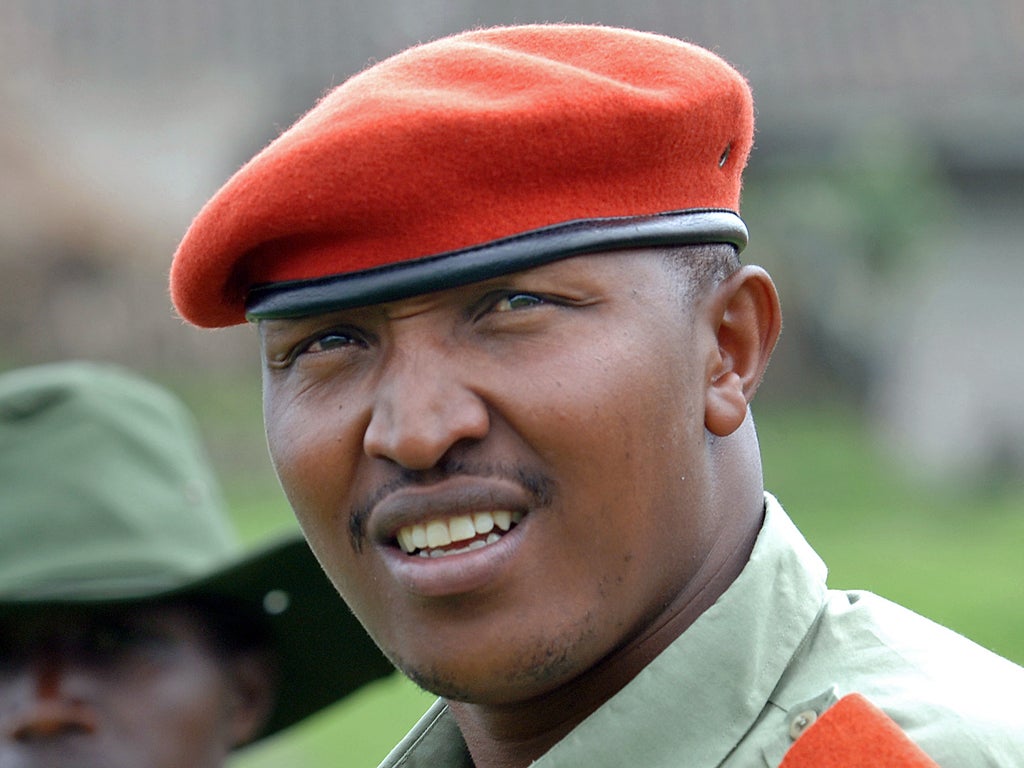
Your support helps us to tell the story
From reproductive rights to climate change to Big Tech, The Independent is on the ground when the story is developing. Whether it's investigating the financials of Elon Musk's pro-Trump PAC or producing our latest documentary, 'The A Word', which shines a light on the American women fighting for reproductive rights, we know how important it is to parse out the facts from the messaging.
At such a critical moment in US history, we need reporters on the ground. Your donation allows us to keep sending journalists to speak to both sides of the story.
The Independent is trusted by Americans across the entire political spectrum. And unlike many other quality news outlets, we choose not to lock Americans out of our reporting and analysis with paywalls. We believe quality journalism should be available to everyone, paid for by those who can afford it.
Your support makes all the difference.Bosco Ntaganda, one of central Africa's most notorious warlords, begins his new life in the Netherlands tomorrow after surrendering to the International Criminal Court at The Hague.
The 39 year old, who is accused of a litany of crimes from rape to recruitment of child soldiers and civilian massacres was flown out of Rwanda three days after handing himself in to the US embassy in the capital, Kigali.
His departure came after Rwanda's President, Paul Kagame, gave assurances that his government would not block the war crimes suspect's exit. US officials said they were “shocked” by Mr Ntaganda's sudden appearance.
The surrender, by a man known as “The Terminator” and thought to control lucrative smuggling networks, has spawned a rash of competing theories. Some analysts state that Mr Ntaganda, formerly a general in army of the Democratic Republic of Congo (DRC), ran for his life after losing control of his latest rebel group, the M23. Rwanda, which had been accused of having “command and control” of M23 in UN reports appears to have washed its hands of him, they say.
A rival theory is that Rwanda had previously arrested Mr Ntaganda before deciding not to hold the ICC indictee in the country. An aid freeze against Rwanda in response to its alleged meddling in DRC has been reversed in recent weeks.
Mr Ntaganda faces two sets of charges. The first relates to his time as second-in-command of the UPC rebels in 2002-2003 in northeastern DRC. His former commander Thomas Lubanga last year became the first man to be convicted by the permanent tribunal of the ICC. The second indictment covers Mr Ntaganda's activities as a commander in the CNDP, a Tutsi-led rebel movement accused of horrendous abuses in Eastern Congo. He was awarded the rank of general in a 2009 peace deal that dissolved the CNDP and sent its leader Laurent Nkunda into exile and house arrest in neighbouring Rwanda.
After another rebellion in the same region last year – which both Rwanda and Uganda are alleged to have supported – a new peace deal is being discussed. It was supported by one faction of M23 under Sultan Makengi, a rival commander, but is unlikely to have offered Mr Ntaganda any return to the army. With the Terminator removed there are slim hopes for at least a temporary peace in Eastern Congo.
Join our commenting forum
Join thought-provoking conversations, follow other Independent readers and see their replies
Comments